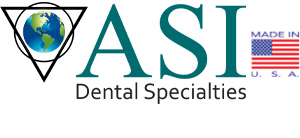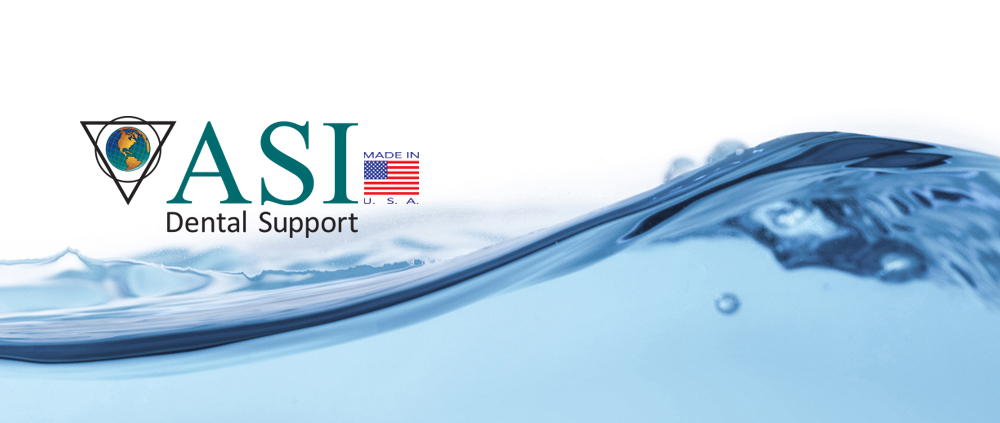What’s the Best Water for My Dental Unit
Given the many different water options to use in your dental unit, it can be perplexing to know which one works best. Should you use the artisanal water filtered through ancient volcanic rock deep beneath Mount Fuji, or will simple municipal tap water suffice?
The confusion arises from the dual requirement that the dental office wants to ensure a clean supply for anti-microbial treatment that also works well with the dental unit components. A brief background assessment of the most common water types will help to clarify your practice needs.
Distilled, Deionized or Demineralized Water – These types of water have the majority of the mineral content removed from them. They sound like a logical choice given the purity seems ideal, and the supply already exists in the office for use with steam sterilizers. Unlike other brands and imported dental units that use brass components and unknown plastics, ASI Dental uses high-quality plastic fittings and stainless steel in our dental unit valves, fittings, and control block. So, corrosion damage to an ASI dental unit is less affected by pure distilled water. However, we would still not recommend pure distilled water for long-term use and recommend using other more acceptable water types for your practice.
Regular Tap Water and Filtered Tap Water – Although it may not seem appropriate, most municipal water supplies are adequate sources of drinking water safe for human consumption. So, tap water can be acceptable for use in the dental unit. The only requirement is that tap water, like every other water source, should be used in conjunction with an in-line water line disinfection to prevent biofilm buildup within the dental waterline tubings (see Waterline Disinfection below).
However, some tap waters from wells may be considered hard water due to the excess amount of minerals contained within them. So, if you have hard water in your area, it would not be advisable to use it long-term as the calcium-like deposits will build up inside the miniature fittings and valves and cause clogging issues. Filtered tap water that removes excess minerals and other impurities may be a viable option but depends on the type used. Whether you can use tap water in your practice should be evaluated by its mineral content, if you deem it safe for consumption and the type of filtration used (if any).
Bottled Drinking Water – This can be a balanced approach providing a readily identifiable clean source of water but usually has balanced mineral content to provide acceptable taste and not be corrosive as pure water. Available in larger jug containers or through a delivery service can make it less expensive to use and store. Most common types of bottled drinking water should be safe to use, but you should still evaluate a brand and source you trust.
Water Line Disinfection
Regardless of the source or type of water used within the dental unit, a key factor is to use a waterline disinfection protocol. Even absolute sterile water will quickly begin to build up a bacterial biofilm within the micro-sized dental tubings used throughout the dental unit. To reduce the bacterial presence, a waterline disinfectant rated safe for use with dental units such as straws, tablets, or solutions are available. We do not recommend most of the tablets, powder mixes, or shock treatments since they will damage the components within the dental unit. We do highly recommend using a disinfectant straw, such as DentaPure 365B, as it maintains an acceptable level of low-concentration iodine disinfectant for a full year (240L of water). They are low cost, require minimal staff maintenance, and do not damage the components within the ASI dental unit.
Regardless of the disinfectant system your office has, it’s always important to use clean water. Distilled water increases the effective lifespan of any disinfectant straw used due to the lack of minerals included, and municipal tap water is generally acceptable. Bottled water is sufficient when paired with a straw or tablet disinfectant. We do not recommend water from in-office distillation or reverse osmosis machines due to the increased chance of bacterial colonies forming within the distillation unit itself.
Order Water Disinfection Cartridge
Water Line Testing
Using a consistent and effective water disinfection protocol is required. Quarterly Dental Unit Water Line (DUWL) testing will ensure compliance with CDC and EPA regulations. Consider your current DUWL protocols and check if your system is compliant. Keeping your water lines beneath the threshold of 500 bacterial colony-forming units per milliliter (<500 CFU/ml) of water is of paramount importance for ensuring the health and safety of your patients. To quickly evaluate the bacteria level within your dental unit waterlines ASI provides in-office water line test kits to use.
Copyright 2021 All Rights Reserved. ASI Medical, Inc. DBA ASI Dental Specialties | Terms & Conditions of Use


